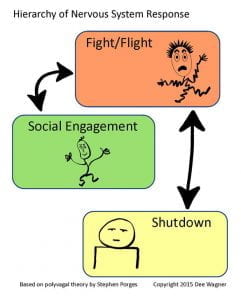As students are about to start their university courses all around the world it is becoming more and more important to be able to cope with and manage stress so that they can enjoy their studies and learn from the whole experience. In order to do this they must be fairly realxed to be able to take in information and to develop their skills and knowledge. If they are too stressed they will not be able to concentrate, their sleep will be affected by worry and anxiety and they will probably not feel like eating or taking care of themselves properly.
This is known as the polyvagal theory (Porges 2009) where the brain reacts to percei ved stress by shutting down organs that we don’t need and energising those that we do via the Vagus Nerve. This nerve is known also as the compassion nerve as it responds quickly to messages from and to the brain. However, in stressful situations it turns up acitivty in the body including the immune system which produces cortisol, this can cause damage to the body in the long term which may not be reversable. It is not actually a new theory but has been happening in our bodies for thousands of years and now that we understand it better, we can work with it to help our bodies function well.
ved stress by shutting down organs that we don’t need and energising those that we do via the Vagus Nerve. This nerve is known also as the compassion nerve as it responds quickly to messages from and to the brain. However, in stressful situations it turns up acitivty in the body including the immune system which produces cortisol, this can cause damage to the body in the long term which may not be reversable. It is not actually a new theory but has been happening in our bodies for thousands of years and now that we understand it better, we can work with it to help our bodies function well.
Using self compassion to combat stress helps the vagus nerve to work better which in turn helps our brain to work better. The 5 Rs for resilience that have been discussed previously in this blog act as a simple reminder on how we can do this and nourish the vagus nerve in the process so it can deal with stress better. Breathing properly stimulates the vagus nerve and takes much needed oxygen to the brain, it really is like giving yourself an internal hug! Eating and sleeping better helps our organs to function better at keeping us healthy and fit. An internal workout while we sleep! Reflecting and relaxing helps us to understand ourselves better, think of it your own personal internal life coach. In these 5 practical ways we can help ourselves to deal with stress and help others to look after themsleves more, become more resilient and to combat stress in their own everyday lives.
